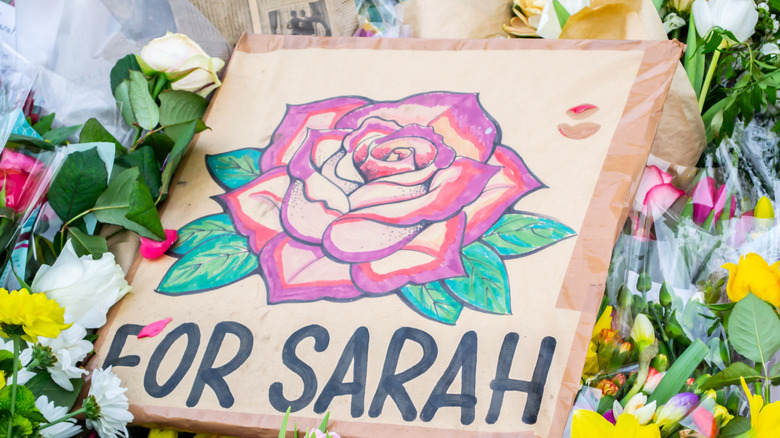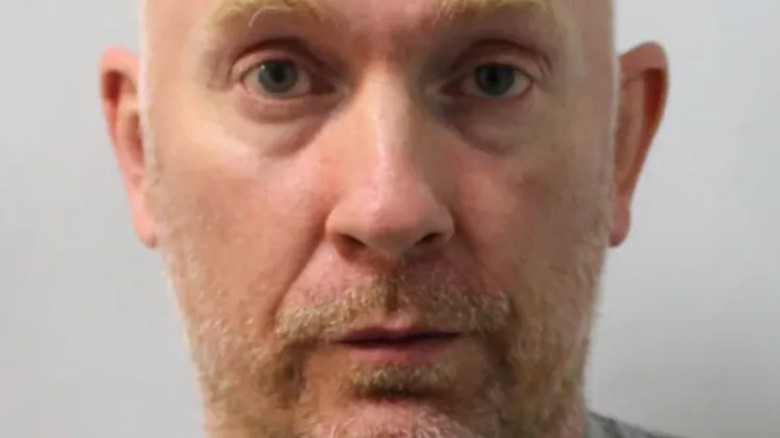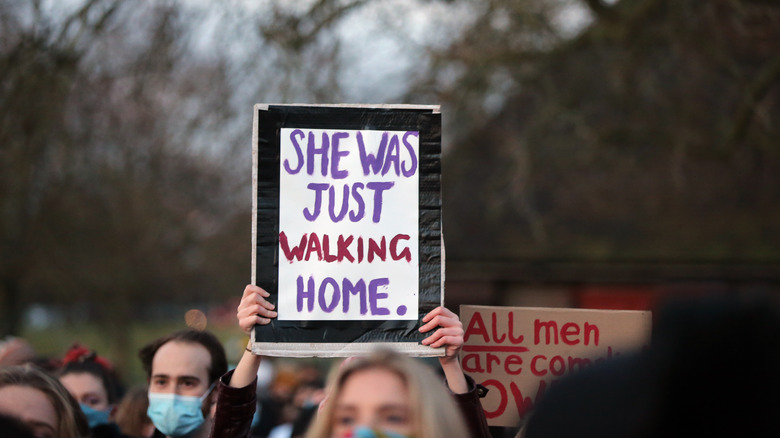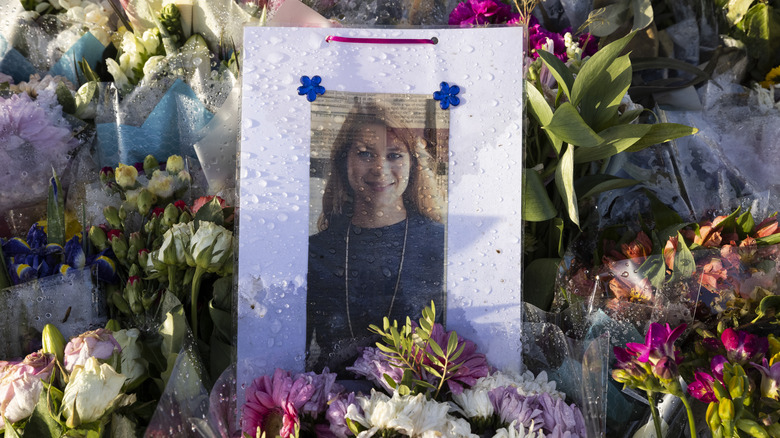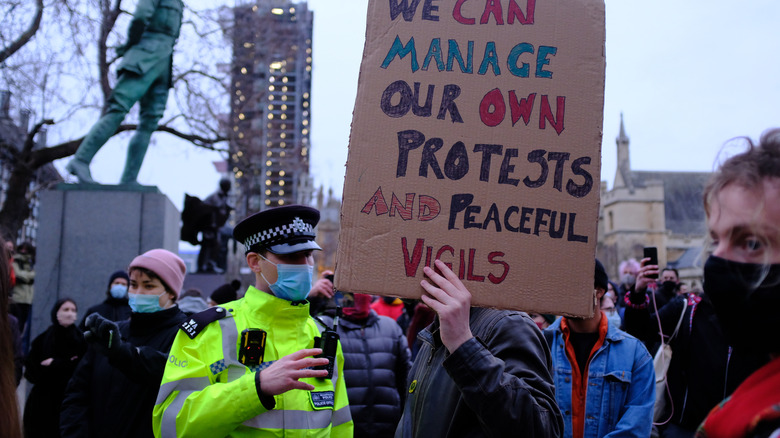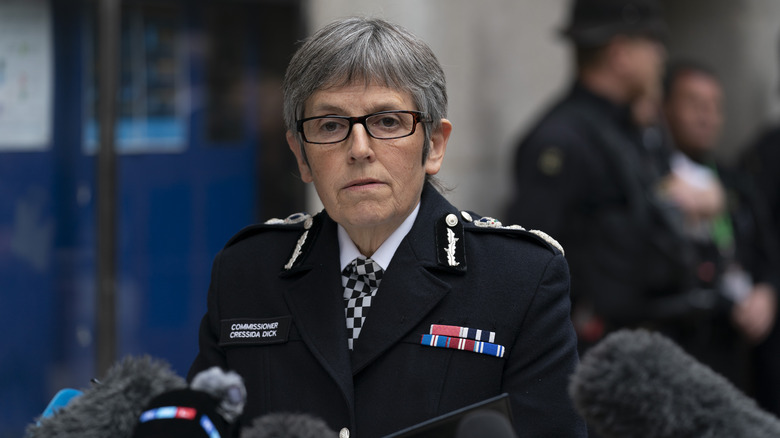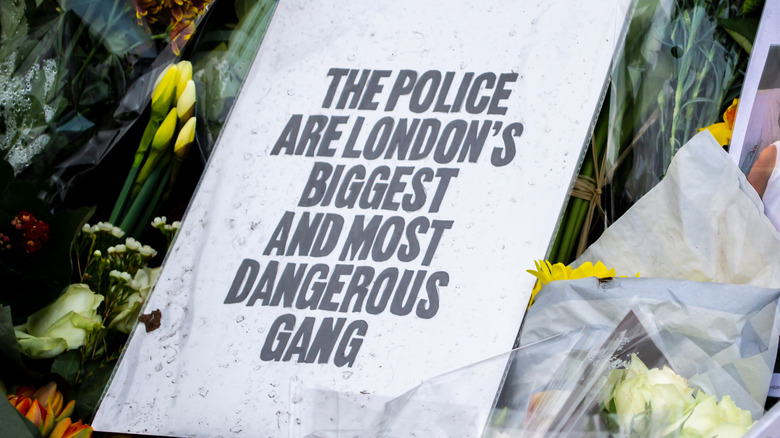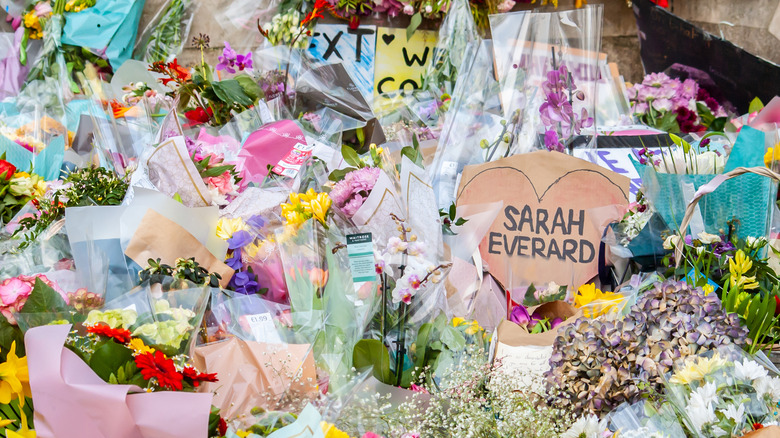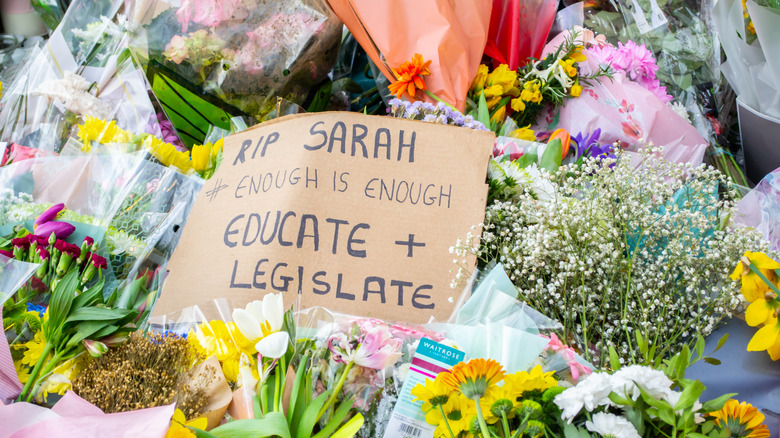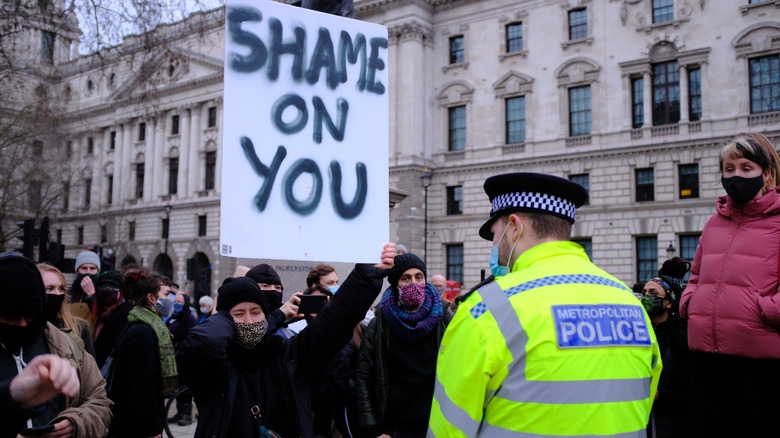Chilling Details About Sarah Everard's Murder
The following article contains mentions of violence and sexual abuse.
Late in the evening of March 3, 2021, Sarah Everard disappeared. Per the Independent, the 33-year-old Londoner had been walking home after visiting a friend in the Clapham neighborhood, but never made it to her destination. Everard's disappearance turned out to be murder — and not just any murder, either. In one of the more appalling breaches of trust in recent memory, a plain-clothes police officer had arrested her under false pretenses, and driven her to a secluded location to assault and kill her.
Apart from the audacity and ruthlessness of the crime itself, the events both well before and much after Everard's murder became pivotal for British society. The murder and the various incidents around it shook the nation to its core in multiple ways and sent ongoing shockwaves over the public, police, and political institutions alike. The murder of Sarah Everard is an extremely complicated case that pinpointed society's failure to protect people in multiple ways, and despite the fact that it's a relatively recent event, the many creepy details surrounding it are almost too numerous to keep track of. Let's take a look at some of the most chilling ones.
If you or anyone you know has been a victim of sexual assault, help is available. Visit the Rape, Abuse & Incest National Network website or contact RAINN's National Helpline at 1-800-656-HOPE (4673).
A police officer used his position of authority to kidnap the victim
Sarah Everard's murderer used a truly unnerving tactic to kidnap her. As iNews describes the events, 48-year-old Wayne Couzens was an experienced police officer, who stopped Everard by claiming that she was breaching COVID-19 pandemic restrictions. He used his official police documentation to "arrest" Everard and handcuff her. Then he put her in the back of his car and drove away.
According to The Guardian, the abduction happened around 9:30 P.M., and an eyewitness described it as looking like a perfectly normal arrest. However, the reality was actually far from it. The cop drove Everard 80 miles away from the scene, after which he sexually assaulted her and strangled her to death — with his police belt, no less (per the BBC). Couzens left and then returned to the scene multiple times, eventually burning Everard's body and hiding the remains in a bag that he threw into a secluded pond. He also made various attempts to erase any evidence that pointed toward him.
"She was detained by fraud," prosecutor Tom Little later spoke of the crime. "The defendant using his warrant card and handcuffs as well as his other police issue equipment to effect a false arrest."
If you or anyone you know has been a victim of sexual assault, help is available. Visit the Rape, Abuse & Incest National Network website or contact RAINN's National Helpline at 1-800-656-HOPE (4673).
The killer made up a creepy lie to hide the murder
Wayne Couzens soon became a person of interest in the case, since he and Sarah Everard were caught on surveillance cameras (via The Guardian). What's more, the license plate of Couzens' rental car was fully visible in some of the footage the investigators managed to acquire, per iNews. According to the Independent, these initial findings, plus cell phone data, helped the police find both the culprit and the victim's remains.
However, during the period between Couzens' arrest and the discovery of Everard's body, the killer tried to mislead the investigators with a particularly odd lie. He claimed that he had abducted Everard under duress from a criminal gang he owed money to. According to Couzens, the gang was forcing him to kidnap women and hand them over. Per the Independent, he even tried to claim that members of said gang gave the order to take Everard.
"Three guys got out [a car], opened my door, opened that door and pushed me out against the front of the car, took the girl, drove off, that's it," Couzins claimed. "So I'm here, I'm off work with stress because I'm here to protect my family. I want to be here 24/7 for my family. They come for my family. I've got nothing. I've got no choice." Suffice to say, the lie didn't hold up for very long. It soon transpired that Couzens was the sole culprit in the crime.
Wayne Couzens had planned his crime for a long time
Wayne Couzens may not have known Sarah Everard in advance, but the kidnapping and murder were far from an impulsive action from him. According to the BBC, Couzens actually lived in Deal, a Kentish town a 90-minute drive away from London. He used a rental car to carry out the attack and had already rented the car several days before kidnapping Everard. Even before that, he'd already visited London numerous times in the weeks before the crime. To further muddy the waters, he switched cars partway through his drive back to Kent after abducting Everard.
Couzens had also put together a comprehensive set of tools to carry out his crime and dispose of the victim's body (per the Mirror). Apart from the handcuffs he used in the fake arrest, the terrifying set of tools he used over the course of the crime included highly premeditated things like sticky floor protector film. To add to the whole "police officer committing a horrible crime" horror show, he reportedly kept at least some of his tools in his locker at his workplace.
However, the killer's premeditation didn't extend to the place he ultimately hid the victim's remains. Everard's body was found in a location that was right next to Couzens' own land, and since he was already a person of interest, this became a key factor in cracking the case.
The murderer has appealed his sentence
Per the BBC, Wayne Couzens received the single biggest sentence British courts had ever dealt out for the murder of a single adult, terror attacks notwithstanding. He was given a whole-life sentence, which means he'll never be set free again, no matter the circumstances. The fact that Couzens misused his position of authority to commit the crime contributed to the sentence, as well as the fact that the judge considered the murderer to be without remorse.
However, this didn't sit well with Couzens. In May 2022, he appealed the sentence in order to seek a (slightly) more lenient one that would potentially allow him freedom at some point down the line. According to Couzens' lawyer, the murderer plead guilty to the crime and is indeed very remorseful, which should be taken into account to revise the sentence. While he agreed that the murderer deserves a decades-long prison sentence, he called into question whether the crime is truly whole-life sentence material.
"Whilst this may well be considered by the public and the court to be a case of equal seriousness to a political, religious, or ideological murder, it is not such an offense, nor does it fall into any other category listed in the schedule," the lawyer wrote. At the time of writing, it's unclear whether the appeal will go anywhere, or how Couzens' other ongoing legal troubles (via BBC) will go.
Police and the public clashed over vigils
Sarah Everard's murder and the ensuing investigation were subjects of considerable national attention, and as the Guardian tells us, people planned large vigil gatherings in her honor. This was a problem for both the police and home secretary Priti Patel, because the U.K. was under heavy COVID-19 pandemic restrictions at the time. Per the Guardian, some vigils were ultimately turned into online events and other forms of paying tribute to Everard. However, British law is somewhat inconclusive about the right to organize public gatherings, and one particular vigil turned into a very difficult situation (via the BBC).
The planned vigil in London's Clapham was already a touchy one, since it was to take place in the area of Everard's abduction — and the suspected killer was a London Metropolitan Police officer. Though the official protest was canceled after some judicial back-and-forth, a hundreds-strong unofficial one gathered anyway. The situation soon got out of hand, as the authorities started fearing the vigil was a protest against the police, per The Guardian. As the crowd reportedly started using abusive language at the police officers, they started arresting attendees.
The aftermath of the event is still ongoing. As of June 2022, six of the vigil participants are facing charges for attending the event during pandemic restrictions (per the BBC). Meanwhile, the high court has ruled that the police were wrong when they threatened the official vigil's organizers with a massive fine and legal consequences.
The authorities faced a backlash for their comments
The concept of a police officer abducting someone is frightening, and after Sarah Everard's murder, the authorities knew they'd lost a lot of goodwill (per The Guardian). In October 2021, the Metropolitan Police stopped using lone plain-clothes officers, and advised people to challenge anyone claiming to be one by demanding to hear police radio proof of the officer's identity — and if that's not possible, to attract the attention of other people by any means necessary, up to and including waving down a bus.
Per the Mirror, the concept of escaping someone who says they're a police officer by hailing a bus was seen as massively misguided. "But Wayne Couzens had a warrant card that would have identified him as a legitimate police officer, and arrested Sarah Everard under the guise of coronavirus powers," Ash Sarkar of Novara Media tweeted. "There's nothing new in here which could have stopped him abusing his powers as a cop."
The bus advice wasn't the only time the police indulged in a public gaffe. "I have 44,000 people working in the Met. Sadly, some of them are abused at home, for example, and sadly, on occasion, I have a bad 'un," Metropolitan Police commissioner Cressida Dick said in July 2021 (per The Guardian). While Dick herself reportedly suffered from the Metropolitan police's misogyny and ultimately resigned in early 2022, the ill-advised comment was seen as an attempt to downplay the issue (via The Guardian).
Wayne Couzens survived vetting to become a police officer
A particularly chilling detail about murderer Wayne Couzens' actions was the fact that he wasn't just impersonating a police officer. Per iNews, he was a very real Metropolitan Police officer who had ended his shift at the parliamentary and diplomatic protection unit on the morning of the day he abducted Sarah Everard.
If you think that a unit like that seems like a pretty responsible position for a man whose actions are wildly criminal and irresponsible and that the police should have vetted him before allowing him to join the force ... well, they did. According to the Oxford Mail, Couzens was vetted by the Thames Valley Police in 2011, and again by London's Metropolitan Police in 2018.
After this particular fact was called out, Thames Valley Police released a statement that confidentiality prevents them from speaking about the process. However, Martin Hewitt of the National Police Chiefs Council noted in October 2021 that something has clearly gone awry, and a review of the processes is in order. "Whilst I have confidence in the processes that we have, the reality is that there are clearly issues that emerge from this specific case, so I think it warrants us looking again and working with those other bodies to ensure that we are learning every lesson that we can around not only the policies but also the practice of how that vetting is taking place in individual forces," Hewitt stated.
The killer had a history of troubling incidents
Though Wayne Couzens was considered fit to work as a police officer right until he murdered Sarah Everard, he had a laundry list of shocking sexual misconduct accusations in his personal history. According to the Oxford Mail, his track record includes an unspecified incident in 2002 — the very year he started as a police officer, as the BBC notes. While the nature of this incident is unclear, the Oxford Mail notes that some of Couzens' colleagues nicknamed him "the rapist." He'd also faced accusations of two indecent exposures, though whether these cases were thoroughly investigated has been called into question (via the BBC).
One particular incident linked to Couzens happened in 2015. "It was reported at the time that a man unknown to the complainant, who was also a man, had been spotted driving a car whilst naked from the waist down," Tom Richards of Kent police described the event. "No arrests were made."
Recent events indicate that Couzens' alleged indecent behavior may have become increasingly frequent shortly before Sarah Everard's death. Per the BBC, in May 2022 the convicted murderer faced charges for no less than four counts of indecent exposure during the two months before she killed Everard. He has pleaded not guilty.
If you or anyone you know has been a victim of sexual assault, help is available. Visit the Rape, Abuse & Incest National Network website or contact RAINN's National Helpline at 1-800-656-HOPE (4673).
The case highlighted how common violence against women is
Wayne Couzens was arrested around midnight on March 9, 2021 (via the Independent). To give an idea of how widespread harassment of young women was in Britain at that exact time, on March 10, The Guardian reported on a poll that revealed that 86% of British women between 18 and 24 years had experienced sexual harassment in public. The number might have been even higher, but 11% of the women who took the survey didn't answer the question at all.
Sarah Everard's murder shone a light on the alarming situation, and according to the Guardian, the case has impacted public attitudes toward abuse and caused the government and the police to implement various methods to battle violence against women.
According to Rebecca Gill of the Rosa charity, the fact that the public understanding of the threats women face is rising is as welcome as it's important. "There has been a revolution of understanding, and the scales have fallen from people's eyes," said Rebecca Gill, executive director at Rosa. "I think there has also been a recognition of how normalized fear is for women. It is a fear we live with, and that we learn very young, and we carry it with us until we are old."
If you or anyone you know has been a victim of sexual assault, help is available. Visit the Rape, Abuse & Incest National Network website or contact RAINN's National Helpline at 1-800-656-HOPE (4673).
The case highlighted some very unsavory things about the police
Apart from the fact that Sarah Everard was murdered by a police officer, the case soon took a magnifying glass to the police's actions. By July 2021, no less than 12 police officers were being investigated for various misconducts regarding matters related to the case or the murderer, Wayne Couzens (per Sky News).
As for crimes where officers misuse their authority status with sexual intent, Couzens was no doubt an extreme case, but as the Independent Office for Police Conduct reported in October 2021, he's far from the only one. According to the office, no less than 52 officers faced gross misconduct proceedings for alleged abuse of position for a sexual purpose — or APSP for short — between 2018 and 2021.
According to research by the End Violence Against Women Coalition, this brighter spotlight hasn't exactly increased the public's trust in its supposed protectors. By November 2021, a whopping 40% of men and 47% of women trusted the police less, possibly due to the highly public events surrounding the Everard case. In fact, in the aftermath of the case, one in 10 women reported that they'd be less likely to go to the police if they were assaulted.
If you or anyone you know has been a victim of sexual assault, help is available. Visit the Rape, Abuse & Incest National Network website or contact RAINN's National Helpline at 1-800-656-HOPE (4673).
